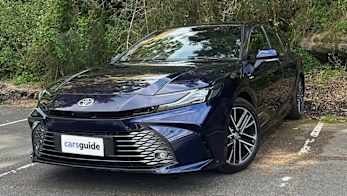What if electric cars and hybrid utes aren’t the next big thing? Should you buy one or wait for hydrogen? Or do you just stick to petrol and diesel?
So you’re thinking of buying your first EV or maybe even a ute that’s a hybrid but there’s this nagging thought that you should stick with plain petrol or diesel. Maybe electric isn’t the next big thing and it's something else like hydrogen and you’ve jumped too soon?
There’s always a risk for early adopters and tech history has taught us that you’re likely to spend a lot more on being one of the first to own the new thing now rather than later — look at CD and DVD players.
We also know that sometimes when you might feel like you’re ahead of the curve, it’s because you’ve veered off the curve and we’ve seen this with Blue Ray discs being beat by DVDs and before that with Beta video formats losing out to VHS.
Cars haven’t ever really faced this kind of dramatic and uncertain change, with the main form of propulsion being the combustion engine for the last century. It’s only been in the past 10 years that electric cars have become truly mainstream and the technology appears to be here to stay despite the fluctuation in demand from markets around the world.
So is buying an electric car risky? Yes, it is for a few reasons, but not in the sense you will have bought into a technology that’s a fad, but more in the sense that some EVs are better than others — much better.
We know that not all EVs are created equal and some car companies future-proof their vehicles better by using electrical architecture that is capable of faster charging rates than others. Our reviews will often let you know all of this information from the maximum charging rates to the architecture voltage.
_0.jpg)
The Polestar 5, Audi A6 e-tron, BYD Seal, Kia EV9, Hyundai Ioniq 5 and Ioniq 6 all use 800V architecture, which charge at a DC rate of up to 350kW — that’s currently the most rapid in Australia.
The best advice is to read up on reviews and you’ll be informed and less likely to buy the EV that's not right for you.
There’s also the resale risk. We know from looking at CarsGuide listings data that resale values currently fall quickly for EVs. That is great if you’re buying second hand but not if you’re selling. We’ve put together a best budget EVs story if you’re interested.
.jpg)
If resale values are making you hesitate before buying an EV then rest assured most cars fall in value to about 60 per cent of their original price after three years. So unless it's a classic or collectible car, or we’re in a pandemic and there’s a shortage of new cars, then you’re not going to make any money from cars.
An interesting dilemma is hydrogen as in fuel cells not combustion. Hydrogen fuel cell technology allows for long distance travel (about the same range as diesel using the same volume of liquid hydrogen. The emissions are pure water. The big problem is there is no widespread infrastructure in place to fuel vehicles. Which is why there are almost no hydrogen vehicles on the market.
The potential is there for hydrogen to be big, really big and if emissions laws become even stricter it’s very possible that any kind of vehicle that currently runs on diesel will be hydrogen powered in the future — from road freight to agriculture and everything in between like utes.
.jpg)
That could be a big psychological jump for many Aussies who have grown up with capable and tough diesel trucks and utes, but people will have to just get used to hydrogen doing what diesel used to do.
Even Toyota Australia’s Vice President of Sales and Marketing Sean Hanley admits the diesel days are almost done.
“I can’t imagine diesel necessarily being a fuel source of the future because the reality is that petrol will do everything it can do, plus some,” Hanley told CarsGuide recently.
“So I think over time diesel is not going to go anytime [in] the next decade, but I think beyond that, … hydrogen will take over diesel eventually."
_0.jpg)
So take it from the guy in charge of selling the diesel HiLux ute to Australians — you have about 10 years before diesel may start to be phased out. Also heed his advice about hydrogen, he’s dropping us a huge hint that future utes will be hydrogen powered.
So what’s the answer to: should you buy an electric or hybrid ute such as the BYD Shark 6, GWM Cannon Alpha or Ford Ranger PHEV?
Well, if we follow Hanely’s inside knowledge then utes of the future won’t be EVs or petrol hybrids, and so you’ll possibly be buying the Blue Ray disc of utes — it’ll work fine, but it won’t be the next big thing. Oh and you might be stuck with it.
.jpg)
In my opinion you’d be best off going diesel now, driving it until the wheels fall off and then buying your first hydrogen ute in 2040.
As for cars and most SUVs, these will very likely all be electric powered eventually. So buying an electric or hybrid car or SUV isn’t a mistake at all, but you’ll pay a lot more than people will in the future and with tech advancing at such a rate, your EV will charge slower and have a shorter range than the latest electric cars coming out with solid state batteries and 1000V architecture.
If anything maybe now the best time to buy that last high-performance petrol car or diesel ute you’d always wanted.





_0.jpg)
.jpg)


.jpg)
.jpg)
.jpg)
.jpg)

.jpg)



.jpg)
.jpg)


_0.jpg)

.jpg)

.jpg)
.jpg)
